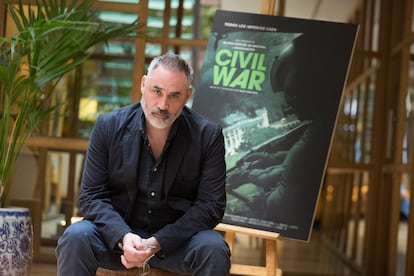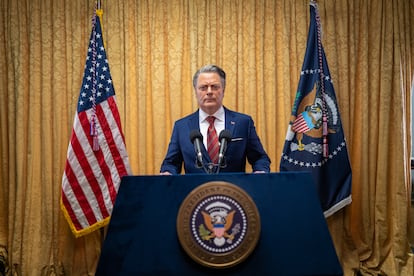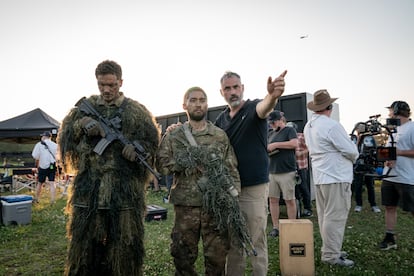‘Civil War’: The hit movie that’s terrified the United States and sent a message to the rest of the world
Alex Garland has directed an ‘anti-war’ film against polarization: ‘It would be insane to think that two states could not agree even in the face of a fascist president’


Alex Garland worries about where the world is going. Especially with the international strife in every news bulletin and the U.S. presidential election just around the corner. Fortunately, this 53-year-old British filmmaker is less worried about the fierce discussions that his latest film has sparked: “It’s inevitable. Everything is polarizing these days,” he says with some frustration, but resignedly. It is precisely this constant social conflict that sparked the idea for Civil War, a movie that addresses very sensitive issues.
“There is a collective hysteria. That’s one of the reasons I made the film. It’s exemplified by the distorted response to Jonathan Glazer’s speech on Gaza at the Oscars. They didn’t even stop to listen to what he was saying, which was quite clear,” Garland explains to EL PAÍS in Madrid, measuring his words as seriously as The Zone of Interest director at the Academy Awards.
That’s why, amid these deep divisions, Garland’s fourth movie triggered debate the very moment the trailer was released. Civil War does not seek to provide answers and leaves part of its message up to the viewer’s interpretation. In the trailer, a militant is seen pointing a shotgun at the protagonists: “What kind of American are you?” A politically-loaded question regardless of the country.
In the simplest synopsis of Civil War, the movie is about a group of journalists who go on a road trip across a destroyed United States in search for the big scoop on the conflict. At the emotional center of the movie is not politics, but the generational clash between two war photographers: the veteran Lee (Kirsten Dunst), who has witnessed a long list of horrors, and the young Jessie (Cailee Spaeny), ready to take on the world with her Nikon and black-and-white photos.
In the film, it is Lee who explains that the objective of war photography is not to provide answers, but to let the public reach their own conclusions — a goal Garland seeks to reach in Civil War. The character, like the director, has doubts about whether she can achieve that objective. Civil War chooses not to state its political affiliations, it makes no mention of parties or ideologies. It’s a decision that’s been hotly discussed by newspapers such as The New York Times, as well as media outlets that do not usually report on movies, such as the Financial Times and Foreign Affairs, which headlined its review: “Civil War succeeds because its policy makes no sense.” Garland has been criticized for not taking sides: for not playing into the polarization.

Garland, in fact, was clear when writing the script, born from rage, in 2020, that what mattered was not American politics, but an extremism that could erupt anywhere. “Polarization is global, both in Western democracies and outside of them. It’s not entirely to do with [former U.S. president] Donald Trump because Donald Trump doesn’t explain all of these other phenomena, like Brexit. Why is it happening? I think it involves things like social media and the failure of centrism. I’m a centrist, I’m a left wing, but I’m a center left. The left and right have been changing power for decades, but people’s lives don’t change. People in poverty traps stay in poverty traps. So not surprisingly they start to get angry and frustrated,” explains Garland, speaking slowly and with pauses, while making his political position clear.
“I am answering as a human being, I don’t feel connected by an umbilical cord to the film. I see movie directing just as a job, so I find the discussions quite interesting. What I have a problem with is large, powerful news organizations that have a single political agenda, not just the way they report stories, but whether they report the story at all,” he says, criticizing the divisions in the media.
Garland decided to set Civil War in the United States simply because it’s the political system known by the rest of the world, sometimes even “more than our own.” But discussion about the film has become even hotter after its success in U.S. theaters. Civil War is the highest-grossing release in the history of the independent studio A24, its first number one.
Journalist Matthew Belloni, in the Hollywood podcast The Town, questioned whether Americans would be willing to go to the cinema to see the “problems that are in the news every day,” taking CNN and Fox News’ election-year catastrophes one step further. But it seems that they were. At the very least, they were curious or morbidly interested in seeing the U.S. destroyed, with 17% of the audience watching the dystopic vision of the U.S. in IMAX theaters. With a $50-million budget, Civil War is A4′s most expensive movie.

A three-term president
In its cold, journalistic zeal, the film does not explain how the United States arrived at the circumstances in which the action takes place, although the clues are there: the president (Nick Offerman) has extended his stay in the White House with a third term, bypassing the Constitution and dissolving the FBI; “the Antifa massacre” has occurred, although the viewer does not know who the victims and executioners were; and a Maoist group has rebelled in Portland.
California and Texas — on opposite sides of the political spectrum in real life — are united by one goal: to overthrow a fascist president. Garland believes there is a certain optimism in this movement: “For some it was insanity. For me, it would be insane to think that these two states could not agree even in the face of a fascist president. I also see a certain optimism after the Second World War. A lot of countries decided that fascism was a terrible idea and that human rights had to be protected. The pessimistic aspect of it is that humans are not brilliant at avoiding terrible problems. We come back from a terrible problem, but we do it again and again.”
Garner also glimpses this optimism when he places the journalistic ideal in the spotlight, even though he is aware that the profession is not very popular today: “Everyone hates them,” he was told.
His affection for the journalism comes from his father, who drew political cartoons for The Telegraph for decades. As a young man, Garland tried to make a career as a war correspondent. At 26, he wrote The Beach about his hopeless youth, which he later adapted into a film with director Danny Boyle, and little by little he let himself be carried away by the current. But throughout his four films, Garland has continued to pursue themes often found in newspapers. In Ex Machina (as in the TV series Devs) he plunged into the power of technology companies, artificial intelligence and even consent, topics he pushed to surreal limits in Men. Meanwhile, with Annihilation, he created a bucolic metaphor around climate change. Always leaving the viewer to come to their own conclusion.

Civil War probably has the easiest framework to understand, since, although Garner wrote the script in 2020, the imagery inevitably evokes what has happened since then: from the assault on the U.S. Capitol to the war in Ukraine. Today, talking about Israel and the war in Gaza is also inevitable. Garner sees clear extremism in that country, and also reflects on the treatment of journalists there: “I think the reason Israel is not letting journalists into Gaza is because they don’t want to fight a PR campaign. In the Vietnam War, journalists were given pretty much unrestricted access, and it caused the American government a really significant problem. And the effect of the journalism was in part to turn public opinion strongly against the war. Since then, when governments have been involved in war, they have used tactics to restrict the activities of journalists. In Iraq, the tactic was to embed journalists with the military, the argument was this protects the journalists, but what it really does is it also controls the journalists.”
This anti-war perspective is what drives Garland. The director recommended the cast of Civil War watch Come and See, a Russian drama about the German invasion in World War II. He believes that “there just aren’t very many anti-war films” and this one is “worth watching.” Garland was also inspired by Apocalypse Now, but he recognizes that it has a touch of romanticism, with music and images that distract from the anti-war message.
According to the director, such romanticism is common in movies: “I don’t think the intention is ever to make a pro-war film, but that doesn’t stop them from being not exactly pro-war, but also not anti-war, just involved in a kind of excitement of war. It’s not quite the same thing as supporting war, but it’s also not oppositional. And certainly I would not hope to make a pro-war film,” he says, evoking the moment when the journalist played by Wagner Moura sees a dispute between the two armies and is excited to go check it out on his own. “When you spend a lot of time around soldiers, you can see fear, enjoyment, joking, boredom in one day... it’s the human state. Just like the amnesia of forgetting the horrors of one conflict to another. From Ukraine to Gaza.”

This process of reflection and making such a big film have left him exhausted, he admits, while rubbing his eyes: “I just want to stop; not forever, just stop.” Perhaps he is longing to be the man in Civil War who lives peacefully on his farm waiting for it all to be over. For now, Garner will help Ray Mendoza — a former Navy Seal and military advisor in Civil War — direct his first film, Warfare, assisting with the technical aspects of directing.
Garner will also reunite with Danny Boyle and Cillian Murphy to make 28 Years Later, the third movie of the zombie apocalypse saga, that has been postponed for decades. Will the experience of the real-life Covid-19 pandemic influence him? “I hadn’t thought about it, but maybe I have: there is an element of Covid in it, which is to do with how something that is absolutely terrible can also be in some ways liberating. The film is about conceptualizing what would happen with an apocalypse over a long period of time.” In the face of all his worries, the zombie apocalypse almost reassures the director.
Sign up for our weekly newsletter to get more English-language news coverage from EL PAÍS USA Edition
Tu suscripción se está usando en otro dispositivo
¿Quieres añadir otro usuario a tu suscripción?
Si continúas leyendo en este dispositivo, no se podrá leer en el otro.
FlechaTu suscripción se está usando en otro dispositivo y solo puedes acceder a EL PAÍS desde un dispositivo a la vez.
Si quieres compartir tu cuenta, cambia tu suscripción a la modalidad Premium, así podrás añadir otro usuario. Cada uno accederá con su propia cuenta de email, lo que os permitirá personalizar vuestra experiencia en EL PAÍS.
¿Tienes una suscripción de empresa? Accede aquí para contratar más cuentas.
En el caso de no saber quién está usando tu cuenta, te recomendamos cambiar tu contraseña aquí.
Si decides continuar compartiendo tu cuenta, este mensaje se mostrará en tu dispositivo y en el de la otra persona que está usando tu cuenta de forma indefinida, afectando a tu experiencia de lectura. Puedes consultar aquí los términos y condiciones de la suscripción digital.








































